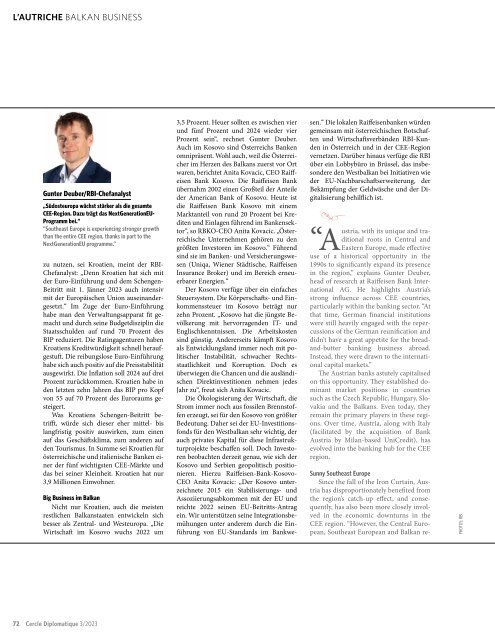CERCLE DIPLOMATIQUE - issue 03/2023
CD is an independent and impartial magazine and is the medium of communication between foreign representatives of international and UN-organisations based in Vienna and the Austrian political classes, business, culture and tourism. CD features up-to-date information about and for the diplomatic corps, international organisations, society, politics, business, tourism, fashion and culture. Furthermore CD introduces the new ambassadors in Austria and informs about designations, awards and top-events. Interviews with leading personalities, country reports from all over the world and the presentation of Austria as a host country complement the wide range oft he magazine.
CD is an independent and impartial magazine and is the medium of communication between foreign representatives of international and UN-organisations based in Vienna and the Austrian political classes, business, culture and tourism. CD features up-to-date information about and for the diplomatic corps, international organisations, society, politics, business, tourism, fashion and culture. Furthermore CD introduces the new ambassadors in Austria and informs about designations, awards and top-events. Interviews with leading personalities, country reports from all over the world and the presentation of Austria as a host country complement the wide range oft he magazine.
You also want an ePaper? Increase the reach of your titles
YUMPU automatically turns print PDFs into web optimized ePapers that Google loves.
L’AUTRICHE BALKAN BUSINESS<br />
Anita Kovacic/CEO Raiffeisen Bank Kosovo<br />
„Österreichische Unternehmen gehören zu den größten<br />
Investoren im Kosovo.“<br />
“Austrian companies rank among the leading investors in Kosovo.”<br />
Gunter Deuber/RBI-Chefanalyst<br />
„Südosteuropa wächst stärker als die gesamte<br />
CEE-Region. Dazu trägt das NextGenerationEU-<br />
Programm bei.“<br />
“Southeast Europe is experiencing stronger growth<br />
than the entire CEE region, thanks in part to the<br />
NextGenerationEU programme.”<br />
zu nutzen, sei Kroatien, meint der RBI-<br />
Chefanalyst: „Denn Kroatien hat sich mit<br />
der Euro-Einführung und dem Schengen-<br />
Beitritt mit 1. Jänner <strong>2023</strong> auch intensiv<br />
mit der Europäischen Union auseinandergesetzt.“<br />
Im Zuge der Euro-Einführung<br />
habe man den Verwaltungsapparat fit gemacht<br />
und durch seine Budgetdisziplin die<br />
Staatsschulden auf rund 70 Prozent des<br />
BIP reduziert. Die Ratingagenturen haben<br />
Kroatiens Kreditwürdigkeit schnell heraufgestuft.<br />
Die reibungslose Euro-Einführung<br />
habe sich auch positiv auf die Preisstabilität<br />
ausgewirkt. Die Inflation soll 2024 auf drei<br />
Prozent zurückkommen. Kroatien habe in<br />
den letzten zehn Jahren das BIP pro Kopf<br />
von 55 auf 70 Prozent des Euroraums gesteigert.<br />
Was Kroatiens Schengen-Beitritt betrifft,<br />
würde sich dieser eher mittel- bis<br />
langfristig positiv auswirken, zum einen<br />
auf das Geschäftsklima, zum anderen auf<br />
den Tourismus. In Summe sei Kroatien für<br />
österreichische und italienische Banken einer<br />
der fünf wichtigsten CEE-Märkte und<br />
das bei seiner Kleinheit. Kroatien hat nur<br />
3,9 Millionen Einwohner.<br />
Big Business im Balkan<br />
Nicht nur Kroatien, auch die meisten<br />
restlichen Balkanstaaten entwickeln sich<br />
besser als Zentral- und Westeuropa. „Die<br />
Wirtschaft im Kosovo wuchs 2022 um<br />
3,5 Prozent. Heuer sollten es zwischen vier<br />
und fünf Prozent und 2024 wieder vier<br />
Prozent sein“, rechnet Gunter Deuber.<br />
Auch im Kosovo sind Österreichs Banken<br />
omnipräsent. Wohl auch, weil die Österreicher<br />
im Herzen des Balkans zuerst vor Ort<br />
waren, berichtet Anita Kovacic, CEO Raiffeisen<br />
Bank Kosovo. Die Raiffeisen Bank<br />
übernahm 2002 einen Großteil der Anteile<br />
der American Bank of Kosovo. Heute ist<br />
die Raiffeisen Bank Kosovo mit einem<br />
Marktanteil von rund 20 Prozent bei Krediten<br />
und Einlagen führend im Bankensektor“,<br />
so RBKO-CEO Anita Kovacic. „Österreichische<br />
Unternehmen gehören zu den<br />
größten Investoren im Kosovo.“ Führend<br />
sind sie im Banken- und Versicherungswesen<br />
(Uniqa, Wiener Städtische, Raiffeisen<br />
Insurance Broker) und im Bereich erneuerbarer<br />
Energien.“<br />
Der Kosovo verfüge über ein einfaches<br />
Steuersystem. Die Körperschafts- und Einkommenssteuer<br />
im Kosovo beträgt nur<br />
zehn Prozent. „Kosovo hat die jüngste Bevölkerung<br />
mit hervorragenden IT- und<br />
Englischkenntnissen. Die Arbeitskosten<br />
sind günstig. Andererseits kämpft Kosovo<br />
als Entwicklungsland immer noch mit politischer<br />
Instabilität, schwacher Rechtsstaatlichkeit<br />
und Korruption. Doch es<br />
überwiegen die Chancen und die ausländischen<br />
Direktinvestitionen nehmen jedes<br />
Jahr zu“, freut sich Anita Kovacic.<br />
Die Ökologisierung der Wirtschaft, die<br />
Strom immer noch aus fossilen Brennstoffen<br />
erzeugt, sei für den Kosovo von größter<br />
Bedeutung. Daher sei der EU-Investitionsfonds<br />
für den Westbalkan sehr wichtig, der<br />
auch privates Kapital für diese Infrastrukturprojekte<br />
beschaffen soll. Doch Investoren<br />
beobachten derzeit genau, wie sich der<br />
Kosovo und Serbien geopolitisch positionieren.<br />
Hierzu Raiffeisen-Bank-Kosovo-<br />
CEO Anita Kovacic: „Der Kosovo unterzeichnete<br />
2015 ein Stabilisierungs- und<br />
Assoziierungsabkommen mit der EU und<br />
reichte 2022 seinen EU-Beitritts-Antrag<br />
ein. Wir unterstützen seine Integrationsbemühungen<br />
unter anderem durch die Einführung<br />
von EU-Standards im Bankwesen.“<br />
Die lokalen Raiffeisenbanken würden<br />
gemeinsam mit österreichischen Botschaften<br />
und Wirtschaftsverbänden RBI-Kunden<br />
in Österreich und in der CEE-Region<br />
vernetzen. Darüber hinaus verfüge die RBI<br />
über ein Lobbybüro in Brüssel, das insbesondere<br />
den Westbalkan bei Initiativen wie<br />
der EU-Nachbarschaftserweiterung, der<br />
Bekämpfung der Geldwäsche und der Digitalisierung<br />
behilflich ist.<br />
with its unique and traditional<br />
roots in Central and<br />
“Austria,<br />
Eastern Europe, made effective<br />
use of a historical opportunity in the<br />
1990s to significantly expand its presence<br />
in the region,” explains Gunter Deuber,<br />
head of research at Raiffeisen Bank International<br />
AG. He highlights Austria’s<br />
strong influence across CEE countries,<br />
particularly within the banking sector. “At<br />
that time, German financial institutions<br />
were still heavily engaged with the repercussions<br />
of the German reunification and<br />
didn’t have a great appetite for the breadand-butter<br />
banking business abroad.<br />
Instead, they were drawn to the international<br />
capital markets.”<br />
The Austrian banks astutely capitalised<br />
on this opportunity. They established dominant<br />
market positions in countries<br />
such as the Czech Republic, Hungary, Slovakia<br />
and the Balkans. Even today, they<br />
remain the primary players in these regions.<br />
Over time, Austria, along with Italy<br />
(facilitated by the acquisition of Bank<br />
Austria by Milan-based UniCredit), has<br />
evolved into the banking hub for the CEE<br />
region.<br />
Sunny Southeast Europe<br />
Since the fall of the Iron Curtain, Austria<br />
has disproportionately benefited from<br />
the region’s catch-up effect, and consequently,<br />
has also been more closely involved<br />
in the economic downturns in the<br />
CEE region. “However, the Central European,<br />
Southeast European and Balkan re-<br />
PHOTOS: RBI<br />
Graz Tourismus – Werner Krug<br />
gions have been affected differently by the<br />
Russian invasion of Ukraine,” says Gunter<br />
Deuber.<br />
While the Eurozone and parts of Central<br />
Europe – Germany in particular –<br />
have suffered from the weakening of the<br />
EU’s economic engine, Southeast Europe<br />
with Croatia and Romania on the forefront<br />
is experiencing a notably better trajectory.<br />
This is due to their lesser dependence<br />
on heavy industry and their reliance<br />
on tourism. Moreover, the post-pandemic<br />
EU reconstruction programmes are exerting<br />
significant influence in these areas.<br />
NextGenerationEU: Eastern Europe Bonus 2.0<br />
Countries in Central and Southeast<br />
Europe are currently receiving substantial<br />
portions of the NextGenerationEU package.<br />
“Among CEE countries, the biggest<br />
beneficiaries in relation to their Gross Domestic<br />
Product are Romania at 13.1%,<br />
Croatia at 12.8%, Bulgaria at 10.4% and<br />
Slovakia at 6.9%,” reports economist Gunter<br />
Deuber.<br />
In total, the EU funding programme<br />
will provide 100 billion euro over the coming<br />
years, with 60 billion euro allocated<br />
to Central and Southeast Europe.<br />
However, this allocation of EU funds<br />
also benefits foreign companies. Germany<br />
and Austria, for instance, host numerous<br />
successful firms in the Eurozone’s internal<br />
market, which in turn participate in contracts<br />
within these countries. “Around ten<br />
to fifteen percent of the NextGenerationEU<br />
funds for CEE countries could potentially<br />
be accessible to companies and<br />
investors from Austria and their local<br />
subsidiaries,” calculates the RBI expert.<br />
Austria’s exports to Central and Southeast<br />
Europe account for nearly 20% – a figure<br />
surpassing that of 2007 and 2008, the peak<br />
of Eastern Europe optimism.<br />
AUSTRIA’S<br />
TRUE LOVE<br />
www.visitgraz.com<br />
72 Cercle Diplomatique 3/<strong>2023</strong>
















